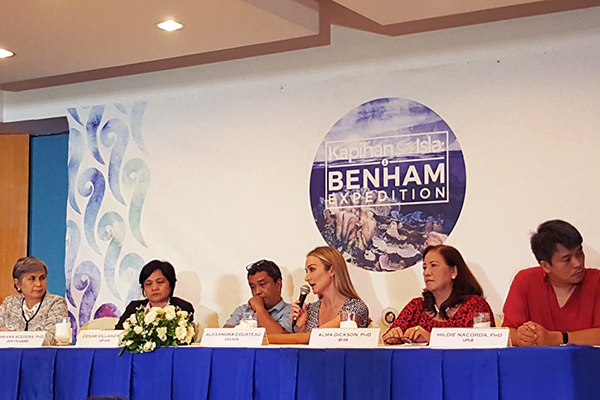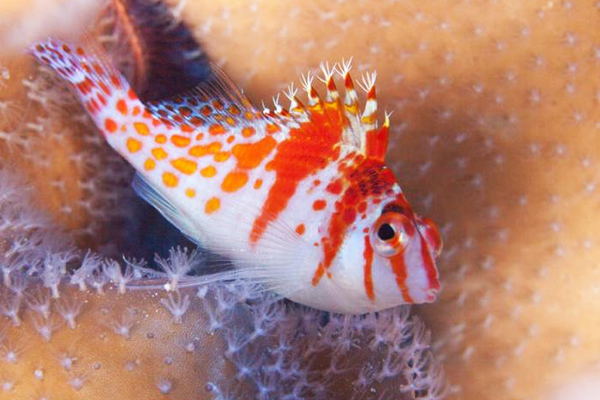French explorer to Philippines: Protect Benham Rise
MANILA, Philippines – The granddaughter of legendary undersea explorer Jacques Cousteau, Alexandra, highlighted in her recent visit to Manila the need to protect natural legacy by restoring the grandeur of the ocean and protecting the country's newest territory, Benham Rise, an underwater plateau north of Luzon.
“When we understand that by protecting and restoring the ocean, we protect and restore our livelihood, our prosperity, our health, our happiness and most importantly the natural legacy that we want to leave to our children,” Cousteau said at a Kapihan sa Isla Forum on Benham Expedition held over the weekend.

National Geographic Emerging Explorer Alexandra Cousteau speaks at the Kapihan sa Isla Forum on Benham Expedition as guest of honor. Philstar.com/Kristine Daguno-Bersamina
Cousteau is the senior advisor to Oceana Philippines, a non-profit organization focused on ocean conservation and advocacy. Oceana Philippines joined marine scientists from the Bureau of Fisheries and Aquatic Resources (BFAR) and the University of the Philippines in the 2016 expedition to Benham Rise.
‘New territory’
Located about 250 kilometers east of Dinapigue, Isabela, the region also known as Benham Plateau has untapped natural resources and is said to be bigger than the Philippines's biggest island, Luzon.
Cousteau said the country needs to protect the Benham Rise which she considers a “treasure.”
“To discover that there’s a place that is deep that is a hundred percent well covered is something that blows my mind and I’m excited for all of us to come together and find ways to protect it,” said Cousteau.
“Because it is a treasure, it’s a treasure today, and it will even be more of a treasure tomorrow,” she added.
The Philippines gained the 13 million-hectare Benham Rise as a “new territory” through the United Nations Convention on the Law of the Sea’s consent, confirming that it is part of the country’s continental shelf and territory.
To get more footage and allow researchers to analyze the marine life on Benham Rise more extensively, Oceana Philippines provided a remotely operated vehicle and technical diver-videographers in the recent expedition.
During the expedition to Benham Bank, the shallowest portion of Benham Rise which started last May 23, at least 200 fish species, including surgeonfish, hawkfish and damselfish were discovered.
Large predators such as tiger shark were also recorded along with green algae and soft sponges, with the aid of modern technology.
Aside from its rich coral reefs, Benham Rise is also found to be a commercially active source of food, such as the in-demand bluefin tuna.
This makes Benham Rise a potential fisheries hotspot, said Oceana Philippines vice president Gloria Estenzo Ramos.
Filipino researchers reached the Benham Bank for the first time in 2014 with more than 50 species of fish and a thick cover of tiered plate corals.
Led by UP and BFAR scientists, the research team back then was able to dive for 25 minutes and film at a depth of 50 meters only.
Philippines as ocean country
Cousteau urged the Philippines to conserve its marine resources beyond their economic value since Filipinos are “intimately connected to the ocean.”
“Unless we protect the oceans, restore their abundance, their diversity, then we won’t be able to feed hungry people here. We will lose the tourism that brings people from all over the world, for the world-class marine resources that exist here,” she said.
As an environmental advocate, Cousteau shared that she has witnessed the devastation of the ocean, from dead corals to depleted ecosystems.
“We’re very good at destroying things and it takes a long time to bring them back at great cost,” the marine explorer said.

Hawkfish recorded during the 2016 expedition to Benham Rise. Oceana Philippines
She warned that if people continue to exploit their marine resources, it could be just a fraction of what once were, unable to feed the world with the loss of tourism and other revenue which human communities depend on.
Cousteau called on the government and stakeholders to work together to protect and manage Benham Rise responsibly.
“Today is the day that we decide to protect them. Today is the day that we take enforcement of legislation seriously. When we take science seriously, when we take supporting fishery for the poorest of the poor for the sustainable fishermen seriously,” she said.
BFAR meanwhile continues to conduct oceanographic studies in the vicinity of Benham Rise and implement fisheries assessment to mark the country’s territories.
- Latest


























